
Easiest Programming Languages to Learn
Jul 03, 2025 6 Min Read 8741 Views
(Last Updated)
Learning to code is one of the most valuable skills you can acquire today, but with so many programming languages to choose from and with different difficulty levels, it can be challenging to know where to start.
This guide ranks the top 10 easiest programming languages from beginner-friendly to slightly more advanced. By the end, you’ll have a clear understanding of which language best fits your learning journey. All the languages listed here come with accessible learning resources.
Table of contents
- Easiest Coding Languages for Beginners – Overview
- Top 10 Easiest Programming Languages for Beginners
- HTML & CSS
- Python
- JavaScript
- SQL
- Java
- C
- C++
- PHP
- Ruby
- Go (Golang)
- How to Choose the Best Language for Your Goals
- Takeaways…
- FAQs
- Which coding is better for the future?
- Which is the easiest programming language?
- Is SQL easier than Python?
- What is the easiest backend language to learn?
- What is the hardest programming language?
- Is HTML easier than Python?
Easiest Coding Languages for Beginners – Overview
| S.No. | Programming Language | Learning Curve | Job Market Demand | Learning Resources |
| 1 | HTML & CSS | Easy | Moderate | Modern HTML & CSS |
| 2 | Python | Very Easy | High | Python Programming |
| 3 | JavaScript | Moderate | Very High | JavaScript Programming |
| 4 | SQL | Easy | High | SQL Course |
| 5 | Java | Moderate | High | Java Programming |
| 6 | C | Moderate | High | C Programming |
| 7 | C++ | Medium | High | C++ Programming |
| 8 | PHP | Moderate | High | PHP Development |
| 9 | Ruby | Medium | Moderate | Ruby Programming |
| 10 | Go | Hard | Growing | Go Programming |
Top 10 Easiest Programming Languages for Beginners
1. HTML & CSS
HTML (HyperText Markup Language) and CSS (Cascading Style Sheets) form the core of web development, providing the structure and design for web pages.

- Popularity:
- HTML & CSS are foundational technologies for web development. They are universally used by every web developer and are essential for anyone aiming to build websites.
- Learning Curve:
- Extremely easy. HTML is a simple markup language, and CSS allows for easy styling of web pages. They require minimal logic, making them ideal for absolute beginners.
- Integration Capabilities:
- HTML & CSS seamlessly integrate with JavaScript, enabling the development of highly interactive web pages.
- Security Features:
- Since these are primarily front-end technologies, security concerns are usually minimal. However, securing how HTML & CSS interact with other scripts (like JavaScript) is crucial.
- Community and Support:
- Large community with numerous tutorials, forums, and resources. This ensures that help is always available for learners.
- Job Market Demand:
- Moderate, as almost every web development job requires knowledge of HTML & CSS.
- Future Prospects and Trends:
- HTML & CSS will continue to be essential for web development. Advancements like CSS Grid and Flexbox make them more powerful over time.
Learning Resource: GUVI Modern HTML & CSS
2. Python
Python is highly recommended for beginners due to its clean and readable syntax. It’s widely used across various industries, including web development, data science, machine learning, and automation.
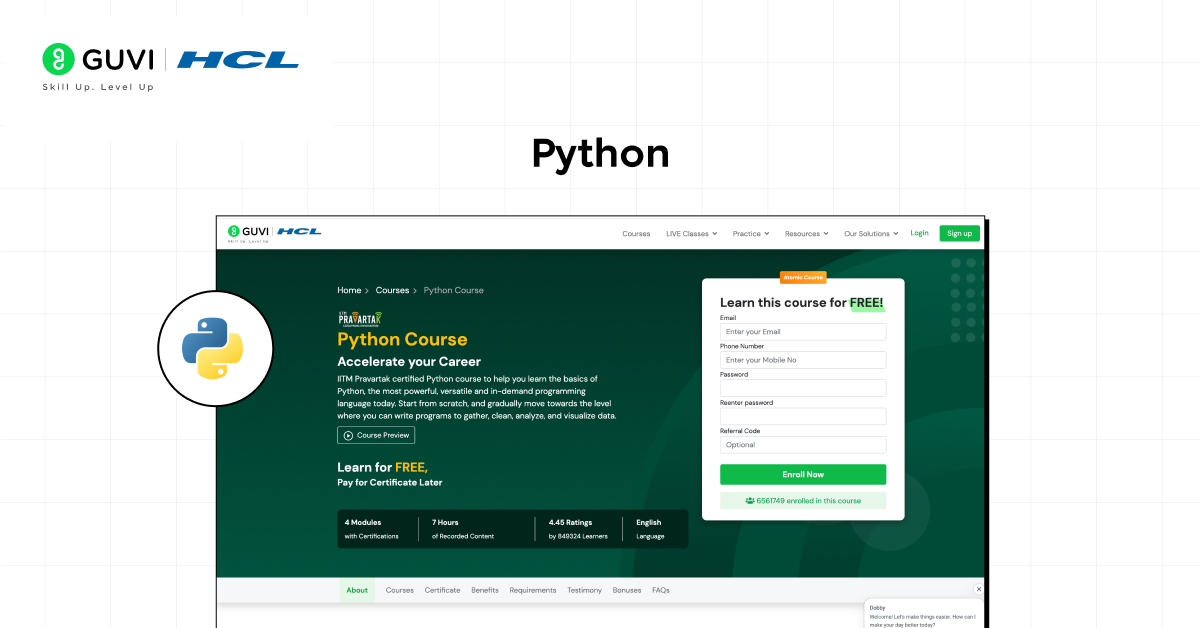
- Popularity:
- Python is one of the most popular languages globally due to its versatility. It’s heavily used in fields like data science, AI, and web development.
- Learning Curve:
- Very easy. Python emphasizes readability, and its syntax is much simpler compared to other languages. It removes many complexities like semicolons and curly braces, making it ideal for beginners.
- Integration Capabilities:
- Python has a broad range of libraries and frameworks (like Django for web development, TensorFlow for AI, and Pandas for data analysis) that make it easy to integrate with various systems.
- Security Features:
- Python is considered secure, especially with its ability to handle errors gracefully and its support for high-level security modules.
- Community and Support:
- Python has one of the largest and most active communities in programming. There are endless resources, tutorials, forums, and libraries available.
- Job Market Demand:
- Python is in high demand, particularly in fields like data science, machine learning, web development, and AI.
- Future Prospects and Trends:
- The demand for Python developers will only grow, especially with the increasing importance of AI, machine learning, and automation.
Learning Resource: GUVI Python Programming
3. JavaScript
JavaScript is a core language of the web, allowing developers to make web pages dynamic and interactive. It’s used for everything from client-side scripting to server-side development with frameworks like Node.js.
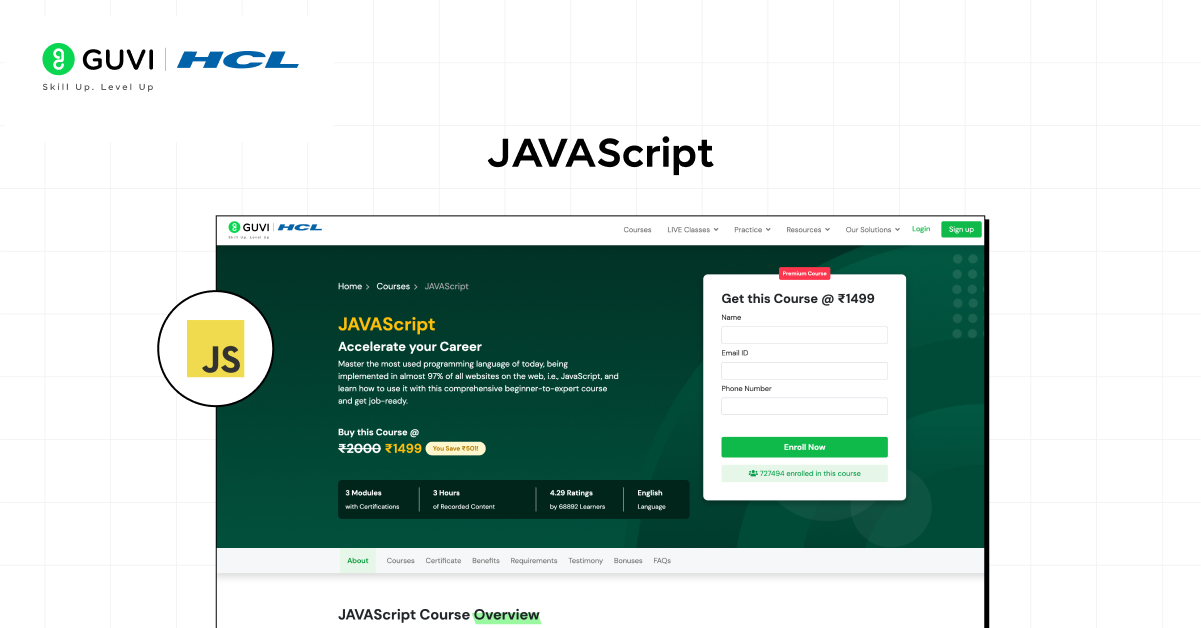
- Popularity:
- JavaScript is the most widely used language for web development. It powers most of the interactive elements on the web.
- Learning Curve:
- Moderate. JavaScript can be challenging due to its asynchronous nature, but modern frameworks like React and Angular have made it easier to handle.
- Integration Capabilities:
- JavaScript integrates seamlessly with HTML and CSS for frontend development and can be used with databases and APIs for backend development (using Node.js).
- Security Features:
- Regular updates are made to JavaScript to address security vulnerabilities, especially in web applications.
- Community and Support:
- JavaScript has a massive community with abundant tutorials, frameworks, and open-source libraries.
- Job Market Demand:
- Very high. JavaScript developers are in high demand due to their importance in both frontend and backend web development.
- Future Prospects and Trends:
- JavaScript’s importance in the tech world continues to grow, especially with frameworks like React, Angular, and Vue dominating the web development scene.
Learning Resource: GUVI JavaScript Programming
4. SQL
SQL (Structured Query Language) is used for managing and querying databases. It’s a must-know for any developer working with data.

- Popularity:
- SQL is extremely popular as it is the standard language for interacting with relational databases. It’s essential in fields like web development, data science, and business intelligence.
- Learning Curve:
- Easy. SQL’s declarative syntax makes it simple to learn the basics, though mastering more advanced querying can take time.
- Integration Capabilities:
- SQL integrates with nearly all programming languages and is used to manage databases in conjunction with applications and systems.
- Security Features:
- SQL offers various security mechanisms such as access control, encryption, and auditing, which are vital for managing sensitive data.
- Community and Support:
- Large and active community with numerous resources.
- Job Market Demand:
- High. SQL is a must-have skill for anyone working with databases, from software engineers to data analysts.
- Future Prospects and Trends:
- SQL remains in high demand as the volume of data grows, and the need for data management skills increases.
Learning Resource: GUVI SQL Course
5. Java
Java is a robust, object-oriented programming language used in everything from mobile apps to large-scale enterprise systems. It’s known for its portability across platforms.
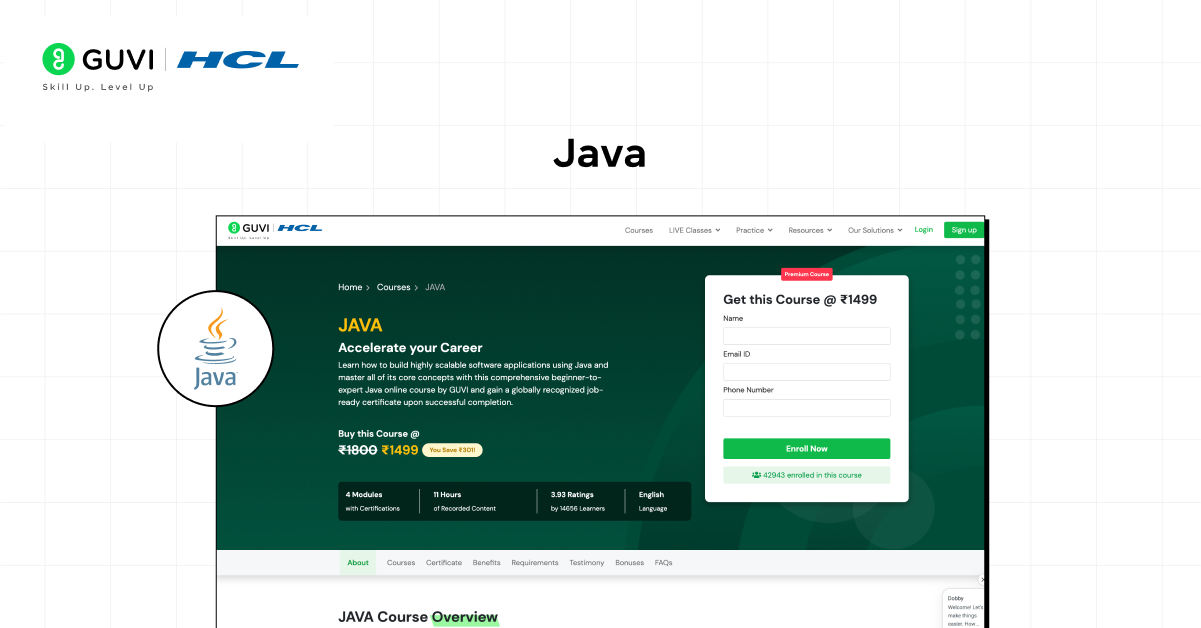
- Popularity:
- Java is one of the most popular languages for backend development, mobile apps (especially Android), and large-scale enterprise applications.
- Learning Curve:
- Moderate. Java’s syntax is more complex compared to Python, and the concepts of object-oriented programming may require additional effort to grasp.
- Integration Capabilities:
- Java is platform-independent and integrates with many systems and devices, including mobile, cloud, and desktop applications.
- Security Features:
- Java has strong security features built-in, making it a reliable choice for enterprise systems.
- Community and Support:
- Large, active community with decades of libraries, frameworks, and support available.
- Job Market Demand:
- High. Java is widely used in enterprises, Android development, and web services.
- Future Prospects and Trends:
- Java’s demand remains strong, particularly in mobile and large-scale systems.
Learning Resource: GUVI Java Programming
6. C
C is one of the oldest and most foundational programming languages. It is often used to write operating systems, embedded software, and high-performance applications.
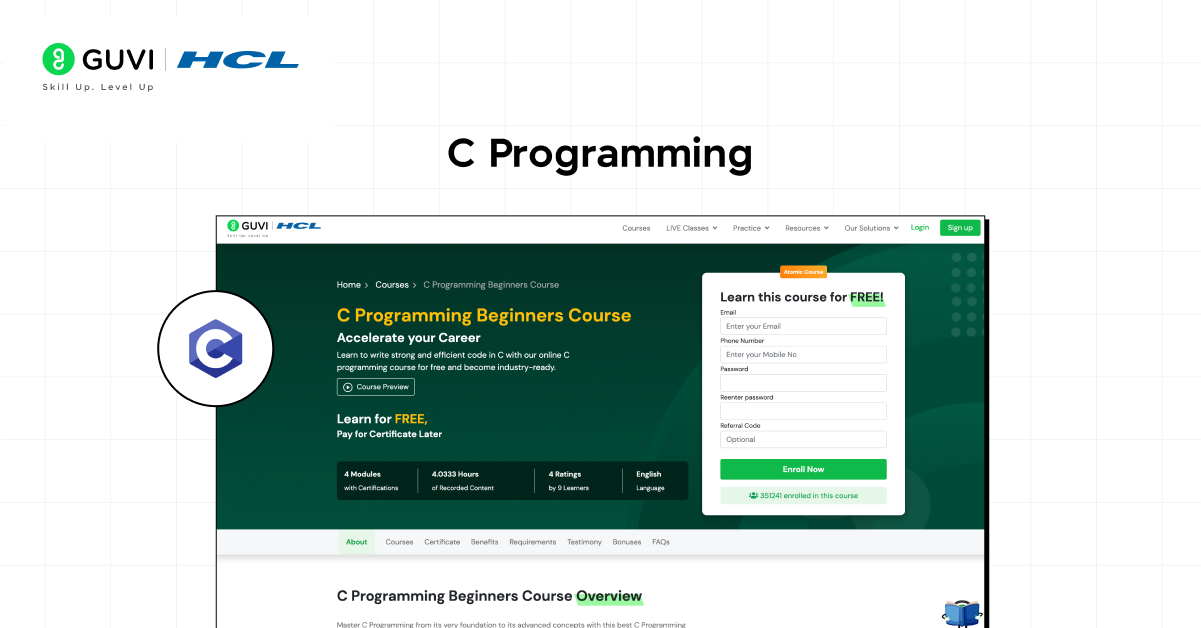
- Popularity:
- C remains highly relevant due to its performance and control over system resources. It’s the go-to language for systems programming, embedded systems, and low-level development.
- Learning Curve:
- Moderate. While the syntax is relatively straightforward, C requires a good understanding of memory management and pointers, which can be tricky for beginners.
- Integration Capabilities:
- C integrates well with hardware-level programming, making it suitable for embedded systems and system software. It also works with many APIs and libraries.
- Security Features:
- Since C allows direct manipulation of memory, security vulnerabilities such as buffer overflows are a concern. However, it offers great flexibility for secure coding when properly handled.
- Community and Support:
- C has a massive and active global community, and most modern languages are based on its principles, ensuring long-term support.
- Job Market Demand:
- High. C is still widely used in industries like game development, embedded systems, and system-level programming.
- Future Prospects and Trends:
- C’s dominance in systems programming is unlikely to diminish, particularly in areas like embedded systems, IoT, and critical infrastructure.
Learning Resource: GUVI C Programming
7. C++
C++ is an extension of C that adds object-oriented features. It’s widely used for high-performance applications, including game development, graphics, and software that requires real-time processing.
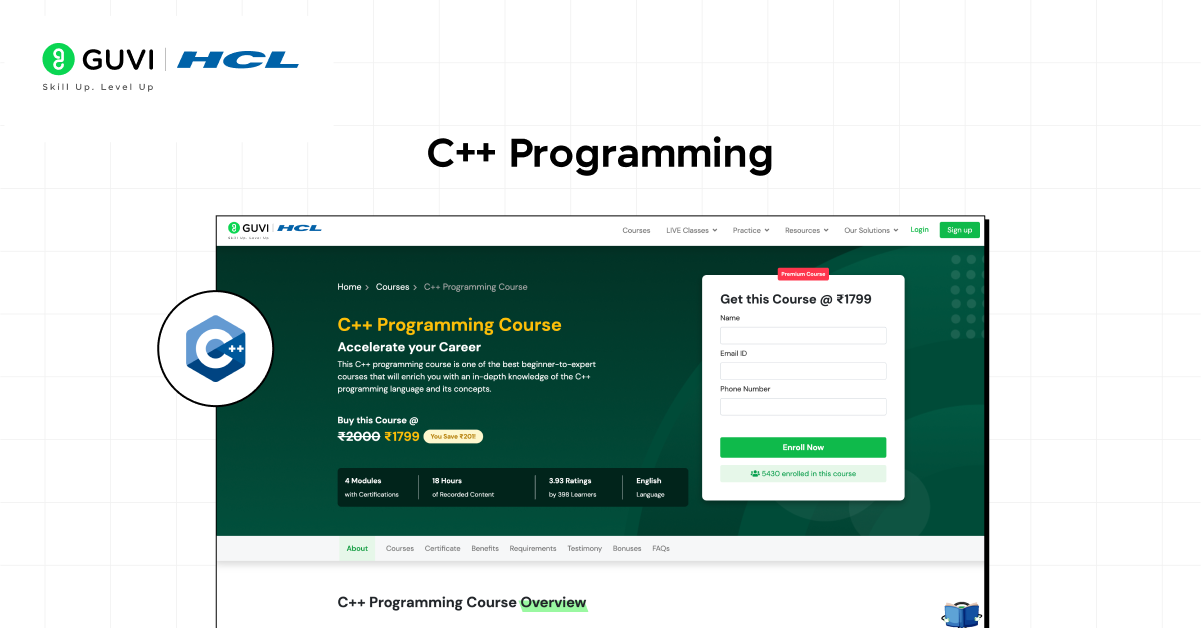
- Popularity:
- C++ is popular in performance-critical applications like gaming engines, high-frequency trading systems, and real-time simulation software.
- Learning Curve:
- Medium. C++ builds upon C, adding complexity with object-oriented principles like classes, inheritance, and polymorphism. Memory management and syntax can be tough for beginners.
- Integration Capabilities:
- C++ excels in systems where performance is critical. It integrates with hardware-level programming and other languages, offering flexibility in application development.
- Security Features:
- Like C, C++ offers high control over memory, but this can lead to vulnerabilities if not properly managed. Secure coding practices are essential.
- Community and Support:
- C++ has a vast community, especially in the game development and software engineering spheres. It also has a rich ecosystem of libraries and frameworks.
- Job Market Demand:
- High. C++ developers are in demand in fields like gaming, system software, financial systems, and performance-critical applications.
- Future Prospects and Trends:
- C++ continues to be a vital language in fields that prioritize performance and efficiency. Game development, 3D modeling, and embedded systems will keep this language relevant.
Learning Resource: GUVI C++ Programming
8. PHP
PHP is a server-side scripting language designed primarily for web development. It’s known for its simplicity and efficiency in building dynamic web pages and applications.
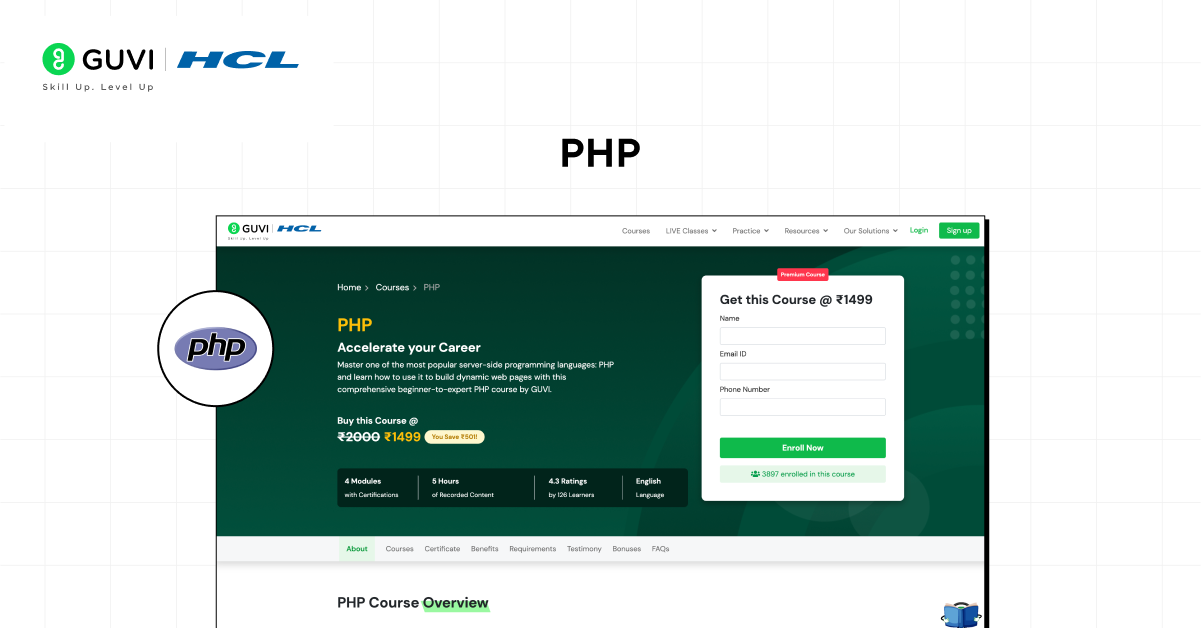
- Popularity:
- PHP powers over 75% of websites, including major platforms like WordPress and Facebook. It’s still one of the go-to languages for web development.
- Learning Curve:
- Moderate. PHP is relatively easy to learn for beginners, especially if you already know HTML and CSS. Its syntax is user-friendly, but mastering advanced concepts takes time.
- Integration Capabilities:
- PHP integrates seamlessly with HTML, databases (such as MySQL), and server technologies, making it ideal for building dynamic websites.
- Security Features:
- PHP has historically had security issues, but modern versions provide security frameworks and practices that can mitigate most vulnerabilities.
- Community and Support:
- PHP boasts a large and vibrant community. There are abundant resources, including frameworks like Laravel and CodeIgniter, to aid in development.
- Job Market Demand:
- High. PHP developers are in demand for building web applications, especially in the freelance and startup sectors.
- Future Prospects and Trends:
- PHP remains popular, especially for small to medium-sized websites. However, it faces competition from JavaScript frameworks like Node.js for backend development.
Learning Resource: GUVI PHP Development
9. Ruby
Ruby is a dynamic, object-oriented programming language known for its simplicity and productivity. Its most famous framework, Ruby on Rails, is widely used for web development.
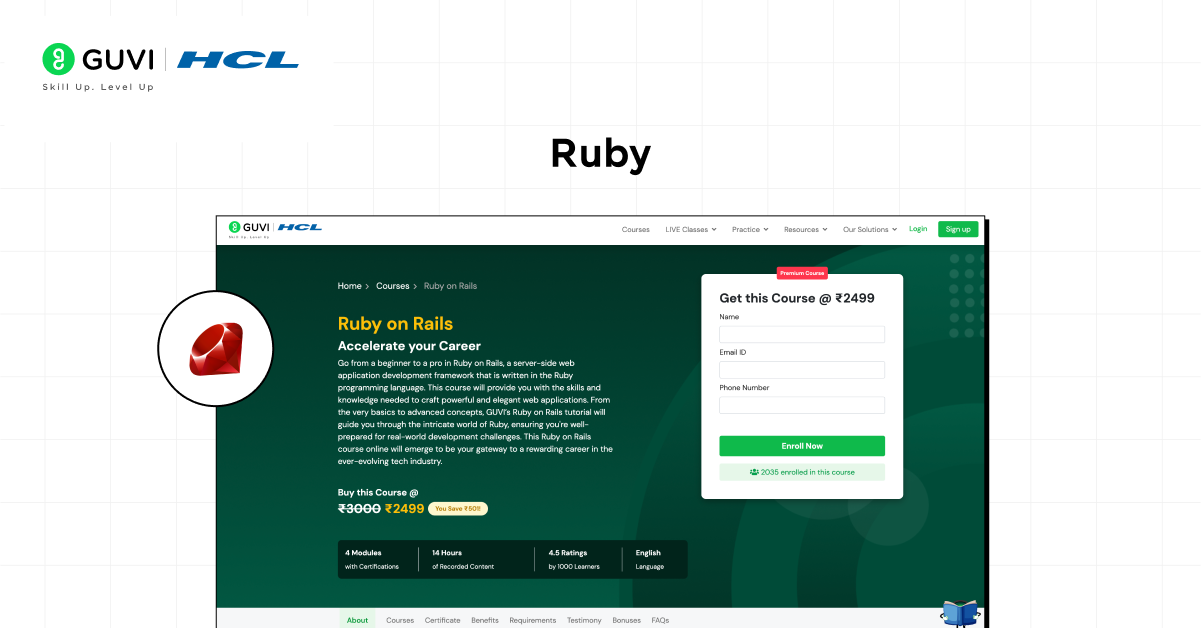
- Popularity:
- Ruby is highly popular in web development, particularly due to the Ruby on Rails framework, which enables rapid development of web applications.
- Learning Curve:
- Medium. Ruby emphasizes simplicity and productivity, but it also incorporates advanced features like metaprogramming, which can be complex to master.
- Integration Capabilities:
- Ruby integrates well with web technologies and databases. Ruby on Rails, in particular, is renowned for creating full-stack web applications.
- Security Features:
- Ruby on Rails offers built-in security measures like strong parameters and CSRF (Cross-Site Request Forgery) protection. However, developers must still be cautious about security risks.
- Community and Support:
- Ruby has an active and supportive community, especially within the web development sphere. There are numerous tutorials, libraries, and tools available.
- Job Market Demand:
- Moderate. While Ruby remains popular in web development, especially for startups, the demand for Ruby developers is somewhat declining as other technologies like JavaScript gain traction.
- Future Prospects and Trends:
- Ruby will likely continue to be relevant in web development, but its popularity is decreasing in favor of newer frameworks and languages.
Learning Resource: GUVI Ruby Programming
10. Go (Golang)
Go is a statically typed, compiled programming language developed by Google. It’s known for its efficiency, simplicity, and excellent concurrency support, making it ideal for high-performance applications.
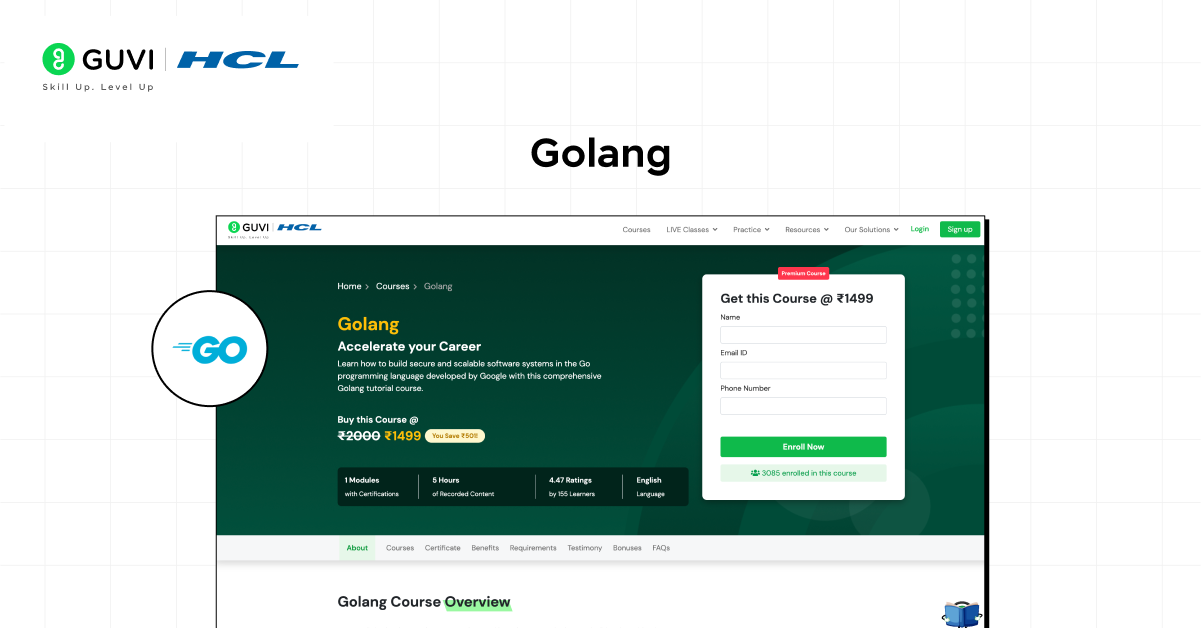
- Popularity:
- Go is becoming increasingly popular, especially for backend development, cloud services, and systems programming. Companies like Google, Docker, and Uber rely heavily on Go.
- Learning Curve:
- Hard. Go has a more complex learning curve compared to languages like Python or JavaScript due to its lower-level nature and emphasis on performance and concurrency.
- Integration Capabilities:
- Go integrates well with cloud services, databases, and backend technologies, making it a great choice for building scalable, high-performance systems.
- Security Features:
- Go is considered highly secure, thanks to its simple and predictable language design. It provides many built-in features for safe memory handling and error management.
- Community and Support:
- Go has a rapidly growing community, especially within cloud computing and microservices development. There’s a wealth of libraries, tools, and frameworks to support Go developers.
- Job Market Demand:
- Growing. As cloud computing and microservices architectures become more prevalent, the demand for Go developers is on the rise.
- Future Prospects and Trends:
- Go’s future looks promising, especially in high-performance computing, cloud-based services, and microservices architectures. Its adoption continues to grow in enterprise environments.
Learning Resource: GUVI Go Programming
How to Choose the Best Language for Your Goals
Choosing the right language depends on your career path and goals. Here’s a quick comparison to help you decide:
| Goal | Best Language |
| Frontend Web Development | HTML, CSS, JavaScript |
| Backend Web Development | PHP, Python, Ruby |
| Data Science/Analysis | Python, SQL |
| Automation and Scripting | Python |
- Consider Your Career Path: If you’re aiming to enter web development, starting with HTML/CSS and then JavaScript is ideal. For data science, Python and SQL are excellent choices.
- Ease of Transition: Once you’ve learned one language, many concepts are transferable, making it easier to pick up others.
Takeaways…
Choosing the right programming language is key to building a solid foundation in coding. For beginners, the ease of learning, job market demand, and future growth potential are crucial factors to consider. From Python’s versatility to Go’s performance in cloud computing, each language on this list offers unique benefits suited to different career paths.
Start with the language that best fits your goals, and gradually expand your expertise to stay competitive in the tech world. I hope this guide has been of help to you, let us know what you thought of it in the comments section below.
FAQs
Python is widely considered the best coding language for the future due to its versatility, simplicity, and demand in fields like AI, data science, and web development.
Python is often regarded as the easiest programming language for beginners due to its simple syntax and readability.
Yes, SQL is generally easier than Python because it has a more straightforward structure and is specifically designed for managing databases.
Node.js (JavaScript) is one of the easiest backend languages to learn, especially for those familiar with frontend JavaScript.
Malbolge is considered one of the hardest programming languages due to its complex and obscure syntax.
Yes, HTML is easier than Python as it is a markup language with a simpler structure, mainly used for creating web pages.





















![What is TypeScript? A Beginner's Guide [2025] 12 typescript](https://www.guvi.in/blog/wp-content/uploads/2025/05/What-is-TypeScript_-A-Beginners-Guide.png)
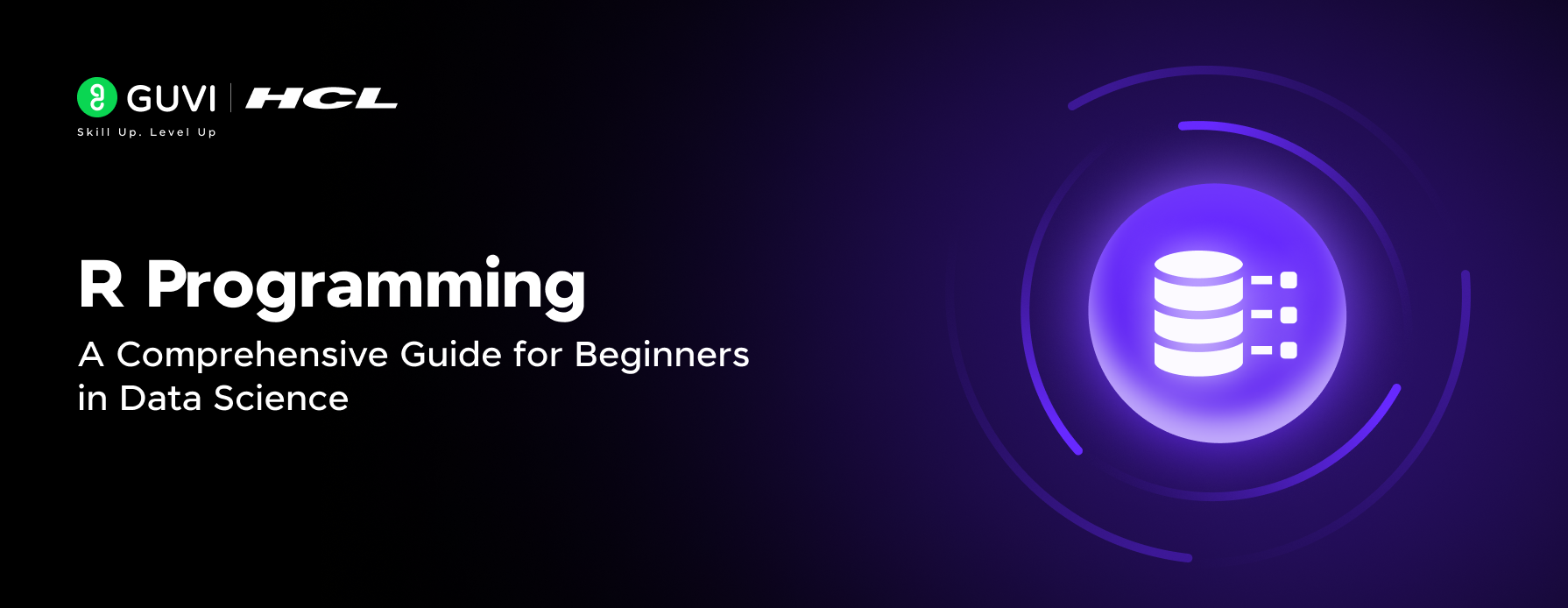
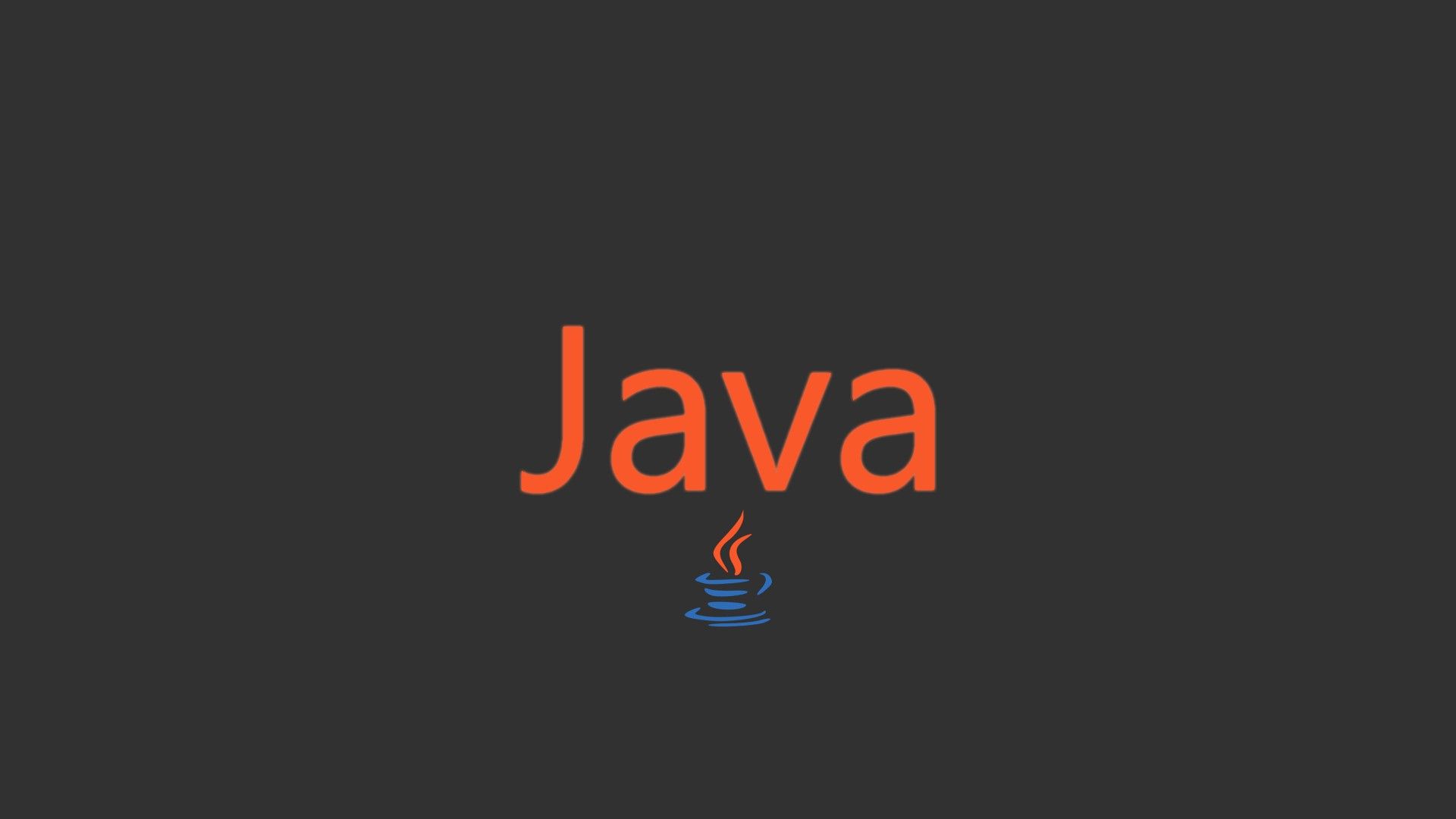
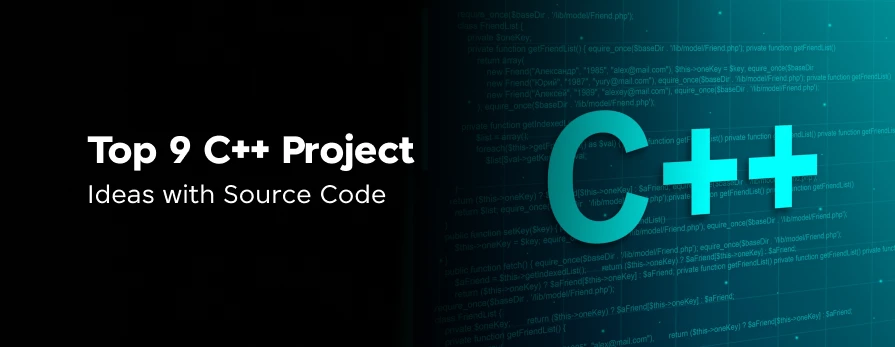
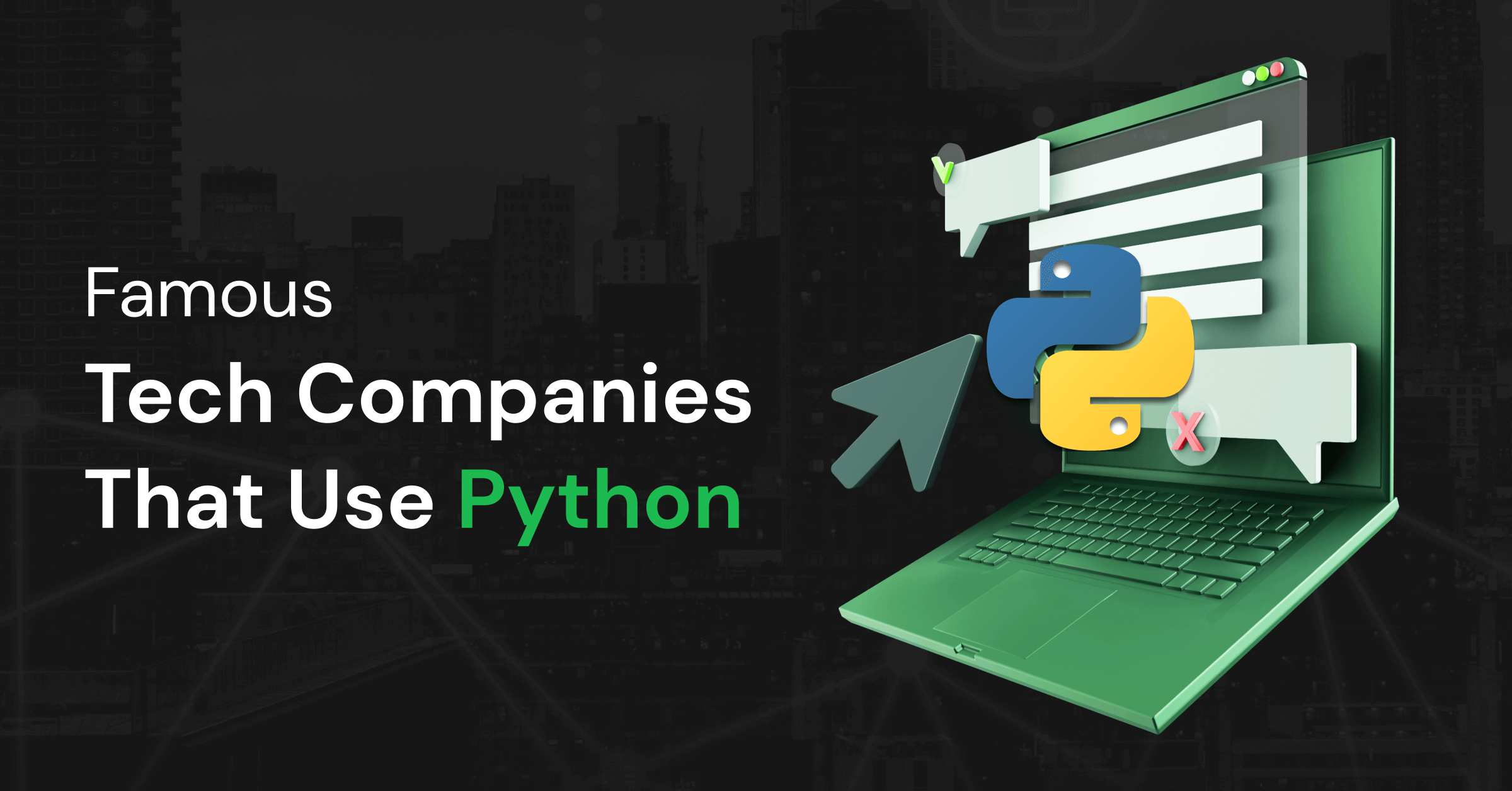
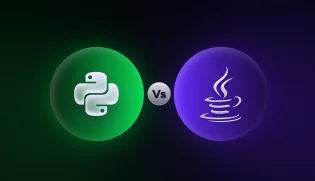
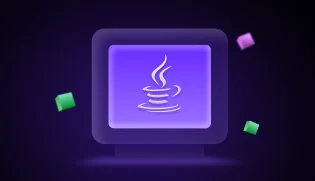
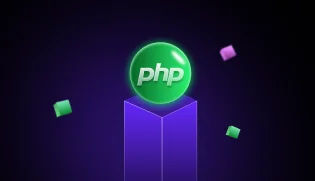


Did you enjoy this article?